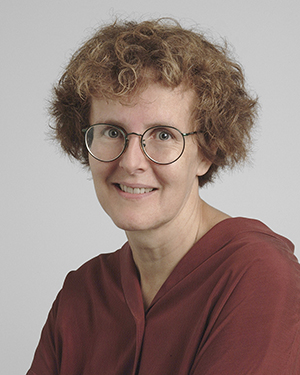Kathleen Berkner Laboratory
-
Kathleen Berkner Laboratory
- Principal Investigator
- Research
- Our Team
- Publications
- Careers
- Research News
Research
The Kathleen Berkner lab studies gamma-glutamyl carboxylation of vitamin K-dependent proteins.
Biography
Kathleen Berkner, PhD, is Staff in the Department of Cardiovascular & Metabolic Sciences.
Education & Professional Highlights
Appointed
1993
Education & Fellowships
Medical Education - University of Michigan
Ann Arbor, MI USA
1977
Undergraduate - University of Minnesota
Minneapolis, MN USA
1972
Fellowship - Baptist Memorial Hospital, Collierville
Memphis, TN USA
Fellowship - Massachusetts Institute of Technology
Cambridge, MA USA
Additional Training
- University of Michigan, PhD, 1977
- Massachusetts Institute of Technology, Postdoctoral Fellow, 1978-1983
Specialty Interests
regulated secretion and post-translational modification of vitamin k-dependent proteins involved in hemostasis
Awards & Honors
- Structure-Function Analysis of the Gamma-Carboxylase, Principal Investigator: Kathleen L. Berkner, PhD, National Heart, Lung and Blood Institute, NIH RO1 1997-2010 HL55666
- Vitamin K Oxidoreductase: Function and Physiology, Principal Investigator: Kathleen L. Berkner, PhD, National Heart, Lung and Blood Institute, NIH RO1 2008-2013 HL81093
Innovations & Patents
- Led the team that generated Novoseven as a hemostatic device and awarded several relevant patents
Research
Gamma-glutamyl carboxylation of vitamin K-dependent proteins is essential for their activation, and a long-term goal of my laboratory is to understand the mechanism and regulation of carboxylation and how dysfunction leads to disease. Carboxylation was originally thought to be important only to hemostasis, but is now known to have a much broader impact on human health, with vitamin K-dependent functions that include calcification, apoptosis, signal transduction and growth control. Carboxylation occurs in the endoplasmic reticulum during the secretion of vitamin K-dependent proteins, which are modified by the combined action of the gamma-glutamyl carboxylase and vitamin K oxidoreductase (VKORC1), as well as unknown components. One area of research is to define this complex process by determining how the secretory process impacts carboxylation, and by identifying other proteins required for carboxylation. Another area of interest is to determine why mutations in the carboxylase cause two distinct diseases, i.e., VKCFD1 in which bleeding is severe or pseudoxanthoma elasticum that is associated with excessive calcification and skin defects. Naturally occurring VKORC1 mutations have also been identified. These mutations alter the response of patients to drugs like warfarin (Coumadin), which is used by millions of people to suppress vitamin K-dependent clotting activity. The mechanism of warfarin inhibition is poorly understood, and a final research focus is to understand warfarin inhibition and the consequence of VKORC1 mutations. Approaches used in our research include mouse models, proteomics, mutagenesis, cellular systems, and biochemical studies.
Our Team
Selected Publications
- Rishavy MA, Hallgren KW, Wilson LA, Usubalieva A, Runge KW, Berkner KL. The vitamin K oxidoreductase is a multimer that efficiently reduces vitamin K epoxide to hydroquinone to allow vitamin K-dependent protein carboxylation. J Biol Chem. 2013 288(44):31556-66. doi: 10.1074/jbc.M113.497297. PMID: 23918929
- Hallgren KW, Zhang D, Kinter M, Willard B, Berkner KL. Methylation of γ-carboxylated Glu (Gla) allows detection by liquid chromatography-mass spectrometry and the identification of Gla residues in the γ-glutamyl carboxylase. J Proteome Res. 2013 12(6):2365-74. doi: 10.1021/pr3003722. PMID: 22536908
- Rishavy MA, Berkner KL. Vitamin K oxygenation, glutamate carboxylation, and processivity: defining the three critical facets of catalysis by the vitamin K-dependent carboxylase. Adv Nutr. 2012 3(2):135-48. doi: 10.3945/an.111.001719. Review. PMID: 22516721
- Rishavy MA, Hallgren KW, Berkner KL. The vitamin K-dependent carboxylase generates γ-carboxylated glutamates by using CO2 to facilitate glutamate deprotonation in a concerted mechanism that drives catalysis. J Biol Chem. 2011 286(52):44821-32. doi: 10.1074/jbc.M111.249177. PMID: 21896484
- Rishavy MA, Usubalieva A, Hallgren KW, Berkner KL. Novel insight into the mechanism of the vitamin K oxidoreductase (VKOR): electron relay through Cys43 and Cys51 reduces VKOR to allow vitamin K reduction and facilitation of vitamin K-dependent protein carboxylation. J Biol Chem. 2011286(9):7267-78. doi: 10.1074/jbc.M110.172213. PMID: 20978134
- Li Q, Grange DK, Armstrong NL, Whelan AJ, Hurley MY, Rishavy MA, Hallgren KW, Berkner KL, Schurgers LJ, Jiang Q, Uitto J. Mutations in the GGCX and ABCC6 genes in a family with pseudoxanthoma elasticum-like phenotypes. J Invest Dermatol. 2009 129(3):553-63. doi: 10.1038/jid.2008.271. PMID: 18800149
- Rishavy MA, Berkner KL. Insight into the coupling mechanism of the vitamin K-dependent carboxylase: mutation of histidine 160 disrupts glutamic acid carbanion formation and efficient coupling of vitamin K epoxidation to glutamic acid carboxylation. Biochemistry. 2008 47(37):9836-46. doi: 10.1021/bi800296r. PMID: 18717596
- Rishavy MA, Hallgren KW, Yakubenko AV, Shtofman RL, Runge KW, Berkner KL. Brønsted analysis reveals Lys218 as the carboxylase active site base that deprotonates vitamin K hydroquinone to initiate vitamin K-dependent protein carboxylation. Biochemistry. 2006 45(44):13239-48. PMID: 17073445
Careers
Training at Lerner Research Institute
Our education and training programs offer hands-on experience at one of the nationʼs top hospitals. Travel, publish in high impact journals and collaborate with investigators to solve real-world biomedical research questions.
Learn MoreResearch News

New research from the Lerner Research Institute published has uncovered for the first time new details about how warfarin interacts with part of the vitamin K disruption process.
